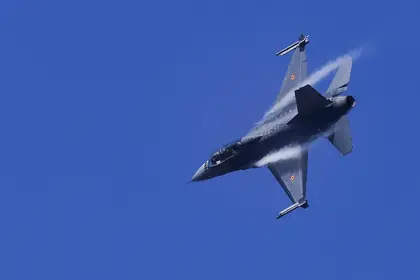In 1973, U.S. rock band Lynyrd Skynyrd likely did not envision that their number one hit song “Freebird” might one day lend its name to a term used for airmen “guns for hire.” On the @MriyaReport Twitter Space – a 24/7 live cast discussing the Ukraine war – an unofficial poll was taken of their 55,000 followers to suggest names for these pilots. “Freebird” came out on top. One thing is certain, air domain warfare has evolved to include the participation of private “gun for hire” fighters.
Last month, Kyiv Post published the Op-Ed, “A Mercenary Air Force for Ukraine? It’s not as Far-fetched as it Sounds,” surfacing the idea of a leased air combat capability (aircraft, aircrew, maintainers, and logistic support) to Ukraine on either a cost per flying hour or a monthly lease. That article was later picked up by Newsweek and roughly another dozen outlets.
JOIN US ON TELEGRAM
Follow our coverage of the war on the @Kyivpost_official.
The attractiveness of the lease option is that it would solve most of the challenges of getting combat air capability into Ukraine: (1) aircraft are available, (2) there is no upfront cost burden associated with buying aircraft, and (3) the private company’s aircrew/maintainer are already trained. In the pilot’s case, they’re trained exceptionally well. While the idea is edgy and unique, the problem with executing it lies in Washington D.C. where there is little appetite for such creativity.
The article later points out that the land and sea domains have long-standing terms/names for privatized “gun for hire” fighters: “mercenaries” and “pirates” (or “privateers)”. Currently, there is no official term or name for privatized air fighters.
That Op-Ed addresses the issue of high-end air combat – modern fighter aircraft operating against one another in often-contested airspace. But, in Ukraine, there are already examples of low-end capability operating effectively in contested airspace. The success of relatively inexpensive Bayraktar unmanned aerial vehicles (UAVs) has proven impressive, and even off-the-shelf quad copters rigged to drop munitions are having success.
If discussions in D.C. already exist considering private companies for high-end air combat, it’s quite likely entrepreneurs and investors are already formulating how to profit from offering privatized low-end air warfare capabilities. For example, a group of investors could buy a few dozen off-the-shelf quad copters, encrypt control frequencies, modify the assets for munitions dropping, and then offer nations in need a leasing option. Such a business model has the inconvenient element of requiring operators to be within “line of sight” of the vehicle and thus near conflict.
For a few million more, larger UAVs operating from satellite or via SpaceX’s Starlink network would offer employees greater protection and provide the customer greater range and payload capacity (i.e. a “bigger boom”). Such an operating construct is quite similar to how the U.S. Air Force operates its MQ-1 Predator and MQ-9 Reaper. If history is any indication, a private company could likely do it cheaper than the U.S. government and still turn a profit.
To many senior U.S. Air Force leaders, the idea of more and more assets muddying up the air space is frustrating; especially those beyond the control of the Air Component Commander. For years, the U.S. government was quite conservative when considering exports of UAVs, keeping those generals somewhat content. Today, General Atomics, the producer of MQ-1s and MQ-9s enjoys increasing exports, but it is highly unlikely they’d sell armed drone capability to a private company. The U.S. however is no longer the only game in town and many other nations have reached near parity on UAV production. Those foreign UAV makers might be willing to sell armed drone technology to private companies, especially for the right price.
For nations like Ukraine which clearly have significant air power capability gaps, a private leasing company is extremely enticing, and it would be significantly cheaper than procuring, organizing, training, and equipping their own force structure.
While the war in Ukraine garners much of the news, it is far from the only conflict, as many “unspoken” conflicts rage around the globe, many in nations with very permissive air domains (i.e. few air defense systems). A private company that leases low-end UAV operations with well-trained personnel ready for combat has a tremendous appeal.
The terms “mercenaries” and “pirates” have existed for centuries – nearly as long as land and naval warfare. As more companies begin to realize the opportunities of “gun for hire” air combatants, Freebirds, Avengers or Valkyries will begin to fill the skies.
In 2014, air warfare celebrated its 100th year of existence. Perhaps the time has come for crafting a term for those who fly and fight as a gun for hire. I simply ask this: if “Freebird” is selected to sit next to “mercenary” and “pirate,” Lynyrd Skynyrd might come out of retirement for the dedication, and that’s a party I’d want to attend.
Colonel (Retired) Jeffrey H. Fischer (@JeffFisch), U.S. Air Force, is a 30-year military aviator with seven combat tours in Iraq, Afghanistan, and the Balkans. Additionally, he served as a defense official at U.S. embassies Austria and Kosovo. He resides in Austria and is an award-winning author of "Live Range" and "Balkan Reprisal", both available globally on Amazon.
The views expressed are the author’s and do not necessarily reflect the official policy or position of the department of defense, the U.S. government or Kyiv Post. The public release clearance of this publication by the department of defense does not imply department of defense endorsement or factual accuracy of the material.
Approved on 6 January 2023, #23-S-0914 from U.S. Department of Defense, Office of Prepublication and Security Review.
You can also highlight the text and press Ctrl + Enter



